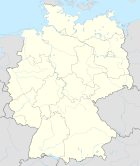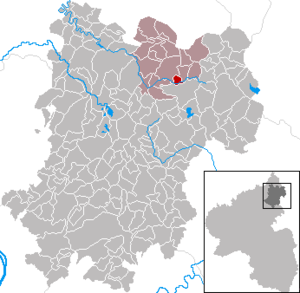Large soaps
| coat of arms | Germany map | |
|---|---|---|

|
Coordinates: 50 ° 38 ' N , 7 ° 58' E |
|
| Basic data | ||
| State : | Rhineland-Palatinate | |
| County : | Westerwaldkreis | |
| Association municipality : | Bad Marienberg (Westerwald) | |
| Height : | 454 m above sea level NHN | |
| Area : | 1.52 km 2 | |
| Residents: | 634 (Dec. 31, 2019) | |
| Population density : | 417 inhabitants per km 2 | |
| Postal code : | 56472 | |
| Area code : | 02661 | |
| License plate : | WW | |
| Community key : | 07 1 43 227 | |
| Association administration address: | Kirburger Strasse 4 56470 Bad Marienberg (Westerwald) |
|
| Website : | ||
| Local Mayor : | Jürgen Steup | |
| Location of the local community Großseifen in the Westerwaldkreis | ||
Großseifen (dialect: Großseife ) is a municipality in the Westerwaldkreis in Rhineland-Palatinate . It belongs to the Bad Marienberg (Westerwald) community .
Geographical location
The community is located in the Westerwald between Limburg and Siegen . The Nister , which belongs to the catchment area of the Sieg , flows in an east-west direction in the immediate vicinity of the place.
history
The near Marienberg preferred site was first mentioned on January 6, 1307 when Count Henry of Nassau with his wife Adelheid to the abbot and convent of Cistercian monastery Marie Instead , the existing income in Velde (= false / wrong-Ritzhausen) and Gray Immersive confirmed . The name of the place has undergone many changes until its current name Großseifen. One wrote Gransifen , Grassyffen , Grassifen , Graensüffen , Graseiffen and finally the current name Großseifen.
Explanation of the naming: The final syllable "siven - sifen - soifen" describes a swamp-like area in this area. The prefix "Grayn - Gran" could mean something like "Crow". The various spellings cannot be explained etymologically. Spelling and hearing errors in the tradition are also possible causes.
In 1511 the income register of the Beilstein rule lists seven households in "Graynsyfe". In 1534 there were 10, in 1565 six and in 1569 seven households. The plague year 1613 led to population losses: in 1621 there were still four families, which after the Thirty Years War were reduced to two in 1650. Afterwards the population slowly recovered in 1665 there were four, in 1697 nine families. At the end of the 18th century the population began to grow rapidly. The cause was the lignite mines in the area, which in addition to agriculture now contributed to the livelihood of the population. In 1780 there were 15 families, in 1809 there were already 24 families or 115 people living in Großseifen.
In the years 1875/76 a school house was built (on the site of today's community center). The children have been attending school in Eichenstruth since 1860 . This school (the building still stands today) had a single room that was completely insufficiently sized and insulated. But the schoolhouse built in 1875/76 did not do justice to the population growth either, so that in 1929 a new school (today's Kirchstein property) was built. In 1966 the school was closed and the students now attend schools in Bad Marienberg. In 1976 the old school was demolished and a village community center was built in its place. It was renovated in 1996/97.
In addition to the lignite mines mentioned, basalt was mined in large soaps in the "Albert Union" . This mine closed in 1963. Today there are only about 50 jobs left in the village. However, the neighboring town of Eichenstruth has a large industrial area in which residents of Großseifen also find work.
The population has risen continuously for 200 years. The 115 inhabitants in 1809 became 249 in 1890. In 1949 there were 365 and in 1987 there were 484 inhabitants. After the development of the “In der Staar” building area, the population rose to 602 in 2006.
politics
Municipal council
The municipal council in Großseifen consists of twelve council members, who were elected by a majority vote in the local elections on May 26, 2019 , and the honorary local mayor as chairman.
Mayor of Großseifen since 1946
| 1946–1954: | Wilhelm Hoffmann |
| 1954–1969: | Walter Utsch |
| 1969–1979: | Hermann Wollenweber |
| 1979-1992: | Jürgen Steup (again from 2009) |
| 1992-1994: | Günter Thiede |
| 1994-1996: | Günther clock |
| 1996-1999: | Günter Thiede |
| 1999-2009: | Thomas Stalp |
| since 2009: | Jürgen Steup |
In the direct election on May 26, 2019, Jürgen Steup was confirmed in his office for another five years with a share of the vote of 71.81%.
Culture and sights
→ see list of cultural monuments in Großseifen
Personalities
- Otto Schmidt (politician, 1899) (1899–1969), administrative officer and politician
literature
- 700 years of Großseifen (1306–2006) , self-published by the municipality, 2006
Web links
- The local community Großseifen on the website of the Bad Marienberg community
- Short portrait with a film about large soaps on SWR television
Individual evidence
- ↑ State Statistical Office of Rhineland-Palatinate - population status 2019, districts, communities, association communities ( help on this ).
- ↑ Hermann Josef Hucke: Place names in the Westerwaldkreis in their dialect pronunciation as well as Ortneckereien ( Memento from January 9, 2014 in the Internet Archive ) , 2010, page 3 (PDF; 129 kB)
- ^ The Regional Returning Officer Rhineland-Palatinate: Local elections 2019, city and municipal council elections
- ^ The Regional Returning Officer Rhineland-Palatinate: direct elections 2019. see Bad Marienberg, Verbandsgemeinde, fifth row of results. Retrieved June 2, 2020 .


